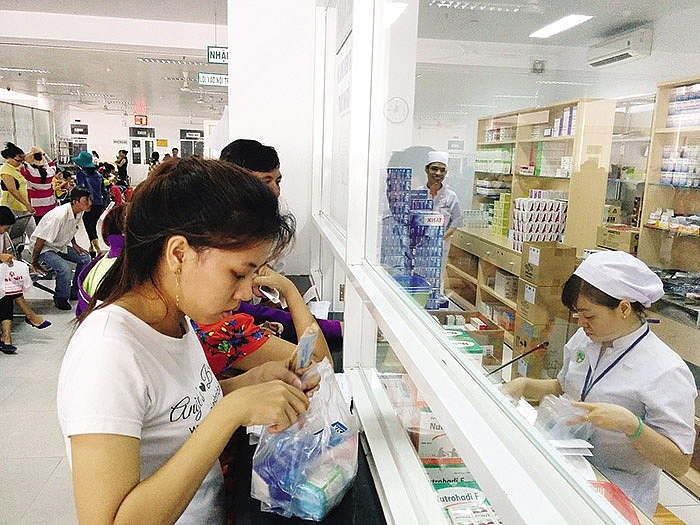Population shift draws foreign players into healthcare sector
 |
| The population boom in Vietnam has drawn the eyes of Indian pharmaceutical firms |
Uday Bhaskar, director general of Pharmaceuticals Export Promotion Council of India, said that the sector has been identified as a priority in bilateral relations between India and Vietnam. India’s global exports of pharmaceuticals in 2017-2018 have been to a tune of $17.27 billion. Among them, Vietnam imported $300 million worth of products from India, still far below the potential of both countries.
According to Bhaskar, the nation’s market is attracting overseas funding as it expands at a double-digit pace, driven by a growing population of nearly 95 million people. This, coupled with the rising health awareness and better access to medicines among the middle class, makes the country an attractive market for Indian pharma companies.
Meanwhile, K Srikar Reddy, the Indian consul general in Ho Chi Minh City, noted that there is a robust, growing demand for quality healthcare in Vietnam, fuelled by expanding disposable incomes. Aging population is also projected to contribute to higher healthcare spending in the country. This will create additional demand for affordable medicine and advanced medical technology and equipment. Furthermore, the country is rapidly emerging as a medical tourist destination in the region. Last year, nearly 15.5 million foreigners arrived in Vietnam, and many of them came to receive medical treatment. Hence, several healthcare facilities have been set up to serve the demand of international patients.
To capitalise on the opportunities, around 30 Indian pharma companies showcased their products and services at the Indian Pharmaceutical Exhibition and B2B Interaction held in Ho Chi Minh City last week. A representative of Pharmexcil noted that this is the second delegation of Indian companies to visit Vietnam in the past six months to hunt for investment and business opportunities in the field.
Cornileus Pharmaceuticals is India’s highly progressive company involved in the research, production, and marketing of active pharma ingredients, pellets, polymers, and ready mixes. Kiran Kumar, the firm’s managing director, said that the firm saw potential in the Vietnamese
market as it has benefitted from a strong customer base in the country. The company is looking to scale up its operations by forming alliances with domestic partners. Meanwhile, Oxford Lifesciences is specialised in manufacturing and exporting more than 50 registered brands of pharmaceutical formulas.
Mahesh Rajendra Kulkarni, senior manager at Oxford Lifesciences, noted that both Vietnam and India have strength in herbal and traditional medicines. Therefore, both sides can join up to produce herbal and traditional medicinal products for both local consumption and for exporting.
According to Vo Tan Thanh, deputy chairman of the Vietnam Chamber of Commerce and Industry, Vietnam’s pharmaceuticals sector has experienced fast-paced development over the past few years. The country’s pharma import turnover reached $2.8 billion in 2017, up 10 per cent against 2016, and reached $3 billion last year. Despite strong growth, production only meets 52.5 per cent of domestic pharmaceutical demand, with the sector still reliant on imported materials. On average, 60,000 tonnes of pharmaceutical materials are consumed every year, 80-90 per cent of which is imported mainly from China and India.
“Vietnamese pharma firms are looking to join forces with overseas investors, including those from India to draw capital, technology, and human resources. Therefore, there is immense potential for further co-operation between Vietnamese and Indian businesses in the field,” Thanh said.
Meanwhile, India ranks third and 14th in the world in terms of pharmaceutical output and value, respectively. The Indian pharma industry has emerged as a world-class, cost-effective generic manufacturer for drugs used for life-threatening diseases such as AIDS, tuberculosis, and cancer.
Moreover, the Indian government has created a project development fund with an initial corpus of five billion rupee ($80 million), for facilitating Indian private investments in Cambodia, Laos, Myanmar, and Vietnam. Eximbank of India is supporting an Indian company to conduct a feasibility study to set up a pharmaceutical manufacturing unit in Vietnam.
What the stars mean:
★ Poor ★ ★ Promising ★★★ Good ★★★★ Very good ★★★★★ Exceptional
Related Contents
Latest News
More News
- State corporations poised to drive 2026 growth (February 03, 2026 | 13:58)
- Why high-tech talent will define Vietnam’s growth (February 02, 2026 | 10:47)
- FMCG resilience amid varying storms (February 02, 2026 | 10:00)
- Customs reforms strengthen business confidence, support trade growth (February 01, 2026 | 08:20)
- Vietnam and US to launch sixth trade negotiation round (January 30, 2026 | 15:19)
- Digital publishing emerges as key growth driver in Vietnam (January 30, 2026 | 10:59)
- EVN signs key contract for Tri An hydropower expansion (January 30, 2026 | 10:57)
- Vietnam to lead trade growth in ASEAN (January 29, 2026 | 15:08)
- Carlsberg Vietnam delivers Lunar New Year support in central region (January 28, 2026 | 17:19)
- TikTok penalised $35,000 in Vietnam for consumer protection violations (January 28, 2026 | 17:15)

 Tag:
Tag:




















 Mobile Version
Mobile Version